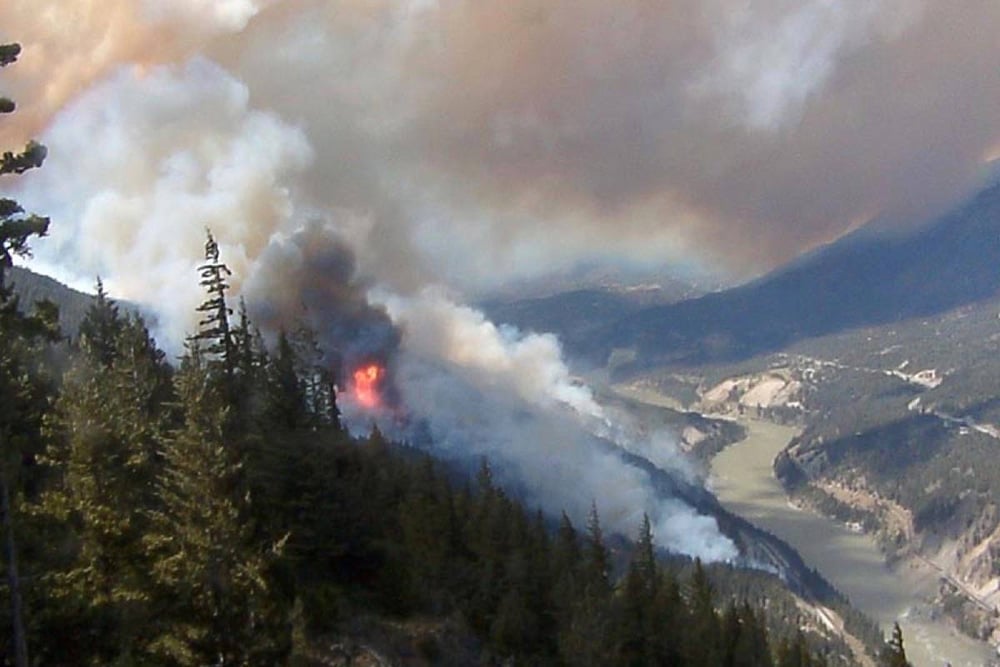Canada’s Transportation Safety Board says it will reverse a decision to not make files publicly available that had been vetted and deemed public through federal access to information laws.
The documents contain thousands of pages of internal government emails discussing the federal investigator’s 2021 investigation into the Lytton Creek fire. They were released to applicants who made formal requests under the Access to Information Act, and summaries of the requests should have been posted online within 30 days.
The Tyee was aware of at least one instance where that hadn’t happened.
Last week, in response to questions, the TSB, which is mandated to conduct independent investigations into transportation occurrences, confirmed that it had failed to post five access to information request summaries related to its Lytton investigation.
These summaries will now appear on the federal government’s website for completed requests in the coming days, a spokesperson said.
The TSB indicated that privacy concerns were the reason for not posting the responses.
“However, after further review of ATIP A-2021-00072, the TSB agrees that the privacy consideration is not affected by publishing this summary and, therefore, the TSB will proceed to publish the summary on the GC Open Government Portal,” it said.
“Furthermore, in respect to whether other ATIP requests summaries relating to [Lytton] investigation R21V0143 will also be posted on the GC Portal, the TSB will be doing so within the next few days.”
The reversal marks a small win in the years-long battle for transparency around what caused the deadly wildfire, which tore through Lytton on June 30, 2021, levelling the community and killing two residents.
There has been widespread speculation that a train sparked the fire, which ignited a day after Lytton set a national heat record when temperatures reached 49.6 C. Residents reported tinder-dry vegetation along the railway tracks, where a train passed through the small southern B.C. community about 15 minutes before the fire was spotted.
According to the TSB investigation, the fire started within two metres of the tracks. Despite investigations by several public bodies, authorities have not provided information about what caused it.
On Oct. 14, 2021, the TSB announced that it had found “no evidence” linking railway operations to the fire.
The BC Wildfire Service and the RCMP conducted their own investigations.
In June of this year, the BC Wildfire Service confirmed to The Tyee that its report on the cause of the fire was completed and had been forwarded to the RCMP.
But police are withholding the information as they continue their criminal investigation. In an email, RCMP Cpl. James Grandy acknowledged the impact of the delays on Lytton residents and said the force could not provide details about the investigation or a timeline for completion.
“All the necessary resources are actively engaged in this ongoing investigation,” Grandy wrote. “At this time, police are not releasing further information in order to protect the integrity of the investigation.”
Lytton Mayor Denise O’Connor said last week that while she hadn’t had a formal update from the RCMP, she believed more information could be released soon.
Some Lytton residents haven’t waited for an official cause to seek compensation through the courts. As the two-year window closed this summer on the statute of limitations to take legal action against those responsible, a handful of lawsuits were filed against Canada’s two major railway companies.
A lawsuit filed by residents a year ago seeks damages from Canadian Pacific and Canadian National railways, the government of Canada and a U.S.-based rail safety company. According to the claim, the fire broke out “on or near” the railway tracks at about the time a train consisting of 157 coal cars passed through Lytton. The train was owned by CP Rail and being operated by CN Rail.
A hearing held earlier this year was unsuccessful in convincing the B.C. Supreme Court to certify the lawsuit as a class action.
In a decision issued in August, Justice Christopher Hinkson noted “deficiencies” in the plaintiff’s statement of claim, including a lack of evidence about the fire’s cause. Hinkson gave leave for the plaintiff to amend the claim and refile it once the deficiencies are resolved.
Hinkson also determined that the TSB investigation, which CN and CP had submitted as evidence, was inadmissible. The report’s author was not qualified as an expert by the court and did not acknowledge his duty of impartiality, Hinkson wrote.
Among the documents filed earlier this year as part of the lawsuit was an affidavit, submitted by the plaintiff’s law firm, Slater Vecchio LLP, containing a handful of internal TSB emails about its Lytton investigation. They indicate that TSB investigators could not get enough residue from the suspected train’s exhaust stack to compare with carbon debris collected near the tracks in Lytton following the fire.
The emails, which totalled about a dozen pages, formed part of a 1,094-page response to an access to information request made on Oct. 28, 2021, according to the affidavit.
Access to information laws give public bodies 60 business days — about three months — to respond to formal requests. In the case of Slater Vecchio’s request, the TSB took more than a year, providing an interim response on Jan. 20, 2023.
Once a response is provided, the information is considered public and the institution is required to post a summary of it on a site for completed access to information requests, where full copies can be requested by members of the public. Exceptions exist for disclosures containing a high degree of personal information.
Unlike formal requests, which come with a $5 filing fee, subsequent requests are considered informal and there is no charge for them. However, there is no legal timeline for the response and it can take the government months to send the documents.
Despite issuing its response to Slater Vecchio in January, the TSB had not posted a summary of the request — or any request related to the Lytton investigation — on its website by May. The Tyee requested the interim response the TSB had provided to Slater Vecchio directly from the public body but was told the files did not exist.
“I don’t see any previous ATIP request relating to the occurrence that would have been published on our website in January,” a TSB information analyst responded at the time.
When The Tyee provided the analyst the request number and date, which were included in the affidavit, the analyst forwarded The Tyee’s request to an acting team leader.
The senior analyst pointed The Tyee to the government’s best practices for posting summaries but would not confirm exactly which exemption it was relying on to withhold the information. The TSB suggested The Tyee submit a formal access to information request for the response.
The Tyee filed that request for the previously released response in June. A month later, the TSB sent the original 1,094-page interim response and more than 1,000 subsequently released pages.
In total, the TSB had identified more than 5,000 pages responsive to the law firm’s request — which was for “all information, briefing notes, emails, presentations, materials, evidence and reports” associated with the Lytton investigation — but the majority was severed under sections of the act that protect things like investigation materials, personal information and solicitor-client privilege.
The files that were released were heavily redacted. But they weren’t redacted beyond what had originally been released, an information analyst confirmed, indicating that the response should have been made available through The Tyee’s initial informal request.
The TSB’s head of access to information and privacy confirmed in July that it would post a summary of the disclosure, which had by then been released twice. But neither the original disclosure nor The Tyee’s request for the same records was ever posted.
A search of TSB summaries showed that nothing had been posted related to the high-profile Lytton investigation by Monday afternoon.
By comparison, the RCMP has posted summaries of four responses it provided to requests for information about its criminal investigation. One of those disclosures obtained by The Tyee contained seven pages of news releases that were already public.
This fall, The Tyee made a formal request to the TSB for a list, by date and file number, of all formal requests regarding its Lytton investigation. That request was denied, with the public body citing exceptions for personal information and information it expects to be published by a government body.
As a result, it’s unclear whether the five responses produced by the TSB — which include the duplicate request by The Tyee — represent a comprehensive list of all requests it has received on the topic or just those the federal investigator has deemed fit to post.
While posting the summaries is not a legislated requirement under the act, it is a “mandatory policy requirement” under Canada’s Directive on Access to Information Requests, the Treasury Board of Canada Secretariat said in an email to The Tyee. It added that it would be contacting the Transportation Safety Board about its failure to post the responses.
Thompson Rivers University associate law professor Matt Malone described policies and directives for responding to informal requests as “soft law,” because they don’t provide the requester with any rights or recourse when the government doesn’t follow them.
“When you make a formal request under the act, they have to respond to you, because it's legislated. There’s a complaint mechanism if they don’t respond,” Malone said, referring to the Office of the Information Commissioner of Canada, which investigates access to information complaints.
“Everything to do with informal requests — seeking a copy of a previously disclosed record — enjoys no rights whatsoever,” Malone said.
Complaints regarding informal requests must go through the Treasury Board of Canada Secretariat, an arm of government that is both subject to access to information laws and responsible for funding its oversight body. A year ago, the secretariat rejected the Office of the Information Commissioner’s request for additional funding to address a backlog of complaints.
“To me, this is an absolute conflict of interest. There’s no way that the government can be responsible for compliance when it’s its own behaviour that’s causing this type of non-compliance,” Malone said.
In addition, guidelines by Library and Archives Canada suggest that records be preserved for only two years. This raises concerns about what becomes of the original, unredacted files, Malone said.
Malone is currently working on a database, set to launch in the new year, that would make records released under federal access to information laws instantly and indefinitely available to anyone online. ![]()
Read more: Rights + Justice, Transportation

















Tyee Commenting Guidelines
Comments that violate guidelines risk being deleted, and violations may result in a temporary or permanent user ban. Maintain the spirit of good conversation to stay in the discussion and be patient with moderators. Comments are reviewed regularly but not in real time.
Do:
Do not: